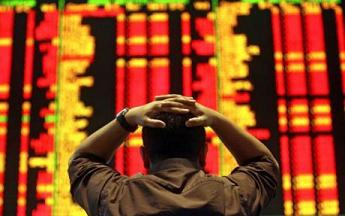UK “Leave” Vote Batters Financial Markets

Thursday’s vote in the UK to leave the European Union triggered a global stock sell-off Friday, prompting fears of a global market crash, recession or both.
Despite polls showing a slight lead for the leave campaign in the week leading up to the vote, markets appear to have been unprepared for the Brexit result, having placed heavy bets on a “remain” outcome.
European stocks led the sell-off, with the UK’s FTSE 100 down by more than 3 percent, Germany’s DAX losing 6.8 percent and France’s CAC 40 declining by 8 percent, as trading volumes on Europe’s stock exchanges hit a new record. The EURO STOXX 50 index fell by 8.6 percent.
Stocks were also pummeled in Asia, with Japan’s Nikkei 225 index falling by nearly 8 percent.
The Dow Jones Industrial Average closed down by 610 points, or 3.4 percent, its biggest fall since August 2015. The Standard & Poor’s 500 erased all of its gains for the year, while the Nasdaq suffered its biggest loss in five years, descending into correction territory. Major banks led the sell-off, with Citigroup falling 9.4 percent and JPMorgan Chase plummeting 6.9 percent.
Stock markets in the EU’s weaker “periphery” fared worst of all, with markets falling by more than 12 percent in Spain, Italy and Greece. Shares in Italy’s two largest banks, Sanpaolo and UniCredit, fell by more than 23 percent, and trading in some Italian banks never even opened.
The only stocks to fare well, tellingly, were those of defense companies, while investors poured into gold and “safe haven” government bonds.
The pound at one point fell to its lowest level against the dollar since 1985, and was down 8.1 percent at the end of the trading day in New York.
Moody’s Investors Service responded to the vote by downgrading the outlook on the UK’s credit rating from “stable” to “negative,” warning of a “prolonged period of uncertainty.” The ratings agency warned of “diminished confidence and lower spending and investment to result in weaker growth.”
The referendum is expected to have its sharpest impact on companies that use the UK as a staging platform for trade and financial transactions with the rest of Europe. Morgan Stanley said it could move one sixth of its British workforce to other EU countries, and JPMorgan CEO Jamie Dimon said similar moves could follow at his firm.
A source at a major US financial firm told Reuters, “The juniors are freaking out. I will tell them to focus on their job and wait for the volatility to pass, but the reality is much, much starker. We’ll have a crash and big layoffs.”
Joe Rundle, an official at the UK-based financial services firm ETX Capital, told Reuters, “Leave’s victory has delivered one of the biggest market shocks of all time… Panic may not be too strong a word.”
Ford said it would cut jobs in Britain as a result of the vote, declaring that it would “take whatever action is needed” to shore up profitability. Its Asian competitors Toyota and Nissan, whose car production in the UK is designed almost entirely for export, particularly to the European Union, hinted at similar steps. Only ten percent of Toyota’s car production in the UK targets the domestic market.
The stock sell-off was likely tempered somewhat by the expectation that global central banks would respond to the crisis with new infusions of cash into the financial markets. The Bank of England and the US Federal Reserve issued statements to the effect that they would do whatever was necessary to rescue the financial markets. Futures markets are now betting that the Federal Reserve will not raise the benchmark federal funds rate until mid-2018.
“The future of the EU itself is now clouded, as a rising chorus of populist voices in places like the Netherlands, France, Italy and Spain will no doubt call for reconsideration of their own membership,” David Joy, chief market strategist at Ameriprise, told the Financial Times.
In an interview with the financial channel CNBC, former Fed chairman Alan Greenspan said the problems expressed in the Brexit vote were more serious than suggested by most commentators. He said the existence of the euro currency was threatened, declaring that Greece would sooner rather than later be forced out of the currency bloc. He pointed to the political strains created by the exit of the UK and noted that France and Germany had gone to war against one another on several occasions.
Greenspan went on to say that the underlying problem was a “massive slowing” of real income growth across Europe and the US, which he linked to a decline in the growth of productivity and a “huge contraction” in capital investment. As a step toward resolving the crisis, he called for slashing the growth of social entitlements.
The vote also points to a growing tide of protectionist sentiment. Earlier this month, the World Trade Organization reported that anti-trade polices carried out around the world had hit the highest level since 2009. “This vote is a step away from free trade,” Bob Doll, chief equity strategist at Nuveen Asset Management, told the Associated Press.
The Financial Times quoted analysts at Bank of America Merrill Lynch saying the vote would add to a “long string of confidence shocks hitting an already vulnerable US and global economy.” Michael Mullaney, chief investment officer of Boston-based Fiduciary Trust Co., told the Wall Street Journal, “The probability of a global recession that we were teetering on before Brexit is now more in play.”

